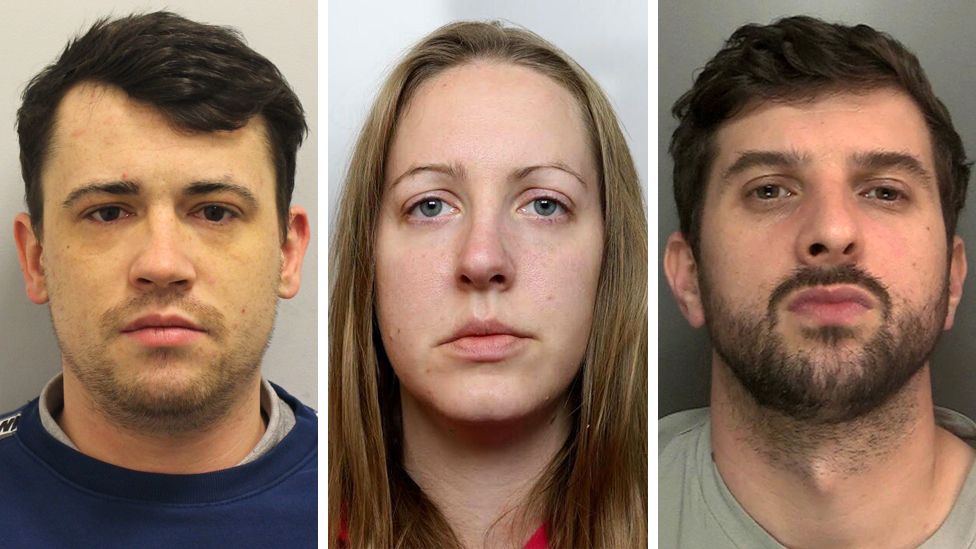
Criminals will be made to attend their sentencing hearings, including by force if necessary, or face the prospect of longer in prison, under new laws proposed by the Ministry of Justice.
It follows a number of high-profile cases where offenders refused to appear for sentencing, including the most recent case of Lucy Letby.
Labour said the government had “dragged its feet”, and called for a timeline.
Rishi Sunak said it would be brought in when Parliament resumes in the autumn.
The new rules give judges the power to order criminals to attend hearings, and custody officers will be able to use “reasonable force” to make offenders appear in the dock or via video link.
Those who do not appear for sentencing could also face an extra two years in jail if they ignore a judge’s order – with the new penalties applying in cases where the maximum sentence is life imprisonment.
However judges can use their discretion in using the new power, the government said – for example not ordering offenders to attend in cases where they might cause disruption and distress victims.
But this would not be mandatory – judges would still have discretion over whether to compel those found guilty to hear their sentences.
Powers already exist to compel attendance and to increase sentences for refusal, as criminals can be held in contempt of court, and existing guidelines also allow the use of reasonable force.
But Ministry of Justice sources say judges do not use their existing powers very often, so putting the ability to increase sentences by two years in legislation is likely to encourage judges to do so.
Equally, the use of force by prison officers would be enshrined in law.
The government said earlier this year that it was committed to changing the law to force criminals to be sentenced in person, after the killers of Olivia Pratt-Korbel, Zara Aleena and Sabina Nessa all refused to stand in the dock.
Calls for a law change were renewed following the widespread outrage over Letby who stopped turning up in the dock towards the end of jury deliberations – and the government again reiterated it was looking to change the law.
Announcing the news on Wednesday, Mr Sunak told broadcasters: “Like many, I was appalled that people who have committed awful crimes somehow are able to take the coward’s way out and not appear in court for their sentencing and to hear the impact that their crimes have had on the victim’s families.
“I don’t think that’s right. That’s why we’re going to change the law so that courts could compel these offenders to be present for their sentencing and to hear the impact that their actions have had, but also, if necessary, to use reasonable force to bring those people to court, and also to add time on to their sentence if they don’t appear.
“I think that’s the right thing to do. People rightly expect criminals to face up to the consequences of their actions.”
He was pictured on social media sitting with Olivia’s mother, Cheryl Korbel, who has campaigned for the change.
Labour’s shadow justice secretary Steve Reed said it was disrespectful, offensive and “beyond cowardly” that criminals had been refusing to come to court.
“We called for new laws on this back in April last year – but the Conservatives have dragged their feet.”
“This is the fourth time in over 18 months the government has promised action – and yet again they have failed to outline a proper timeline on when they will act.”
Mark Fairhurst, chair of the Prison Officers’ Association, said it was “about time” courts were “more robust” with defendants who refuse to appear.
“Let’s listen to the people who really matter in all this and that’s the victims and their families,” he told BBC Breakfast earlier this month.
“And if we have to force people to appear in the dock, then we have the staff to do it, we have the training to do it, we have the skills to do it. Let’s make it happen,” Mr Fairhurst added.
There is some scepticism as to whether criminals care about the threat of additional years on their sentences.
Speaking on the BBC’s Newsnight programme earlier this month, barrister John Cooper KC said a defendant facing a long-term prison sentence is “hardly going to be incentivised by having an extra year or so thrown on top of it for not coming into court”.
“There is nothing really the government, or any government, can do about the situation we’re in,” he said.
Letby murdered seven babies and tried to kill six more while working at the Countess of Chester Hospital neonatal unit between 2015 and 2016.
The 33-year-old received a rare whole life order, meaning she will spend the rest of her life in prison.
Many people, including the mother of two of Letby’s victims, criticised her refusal to attend sentencing, calling it “just one final act of wickedness from a coward”.
